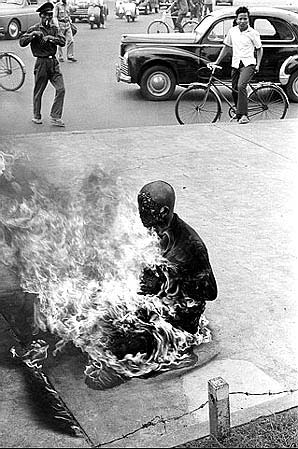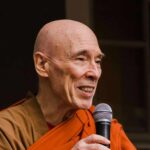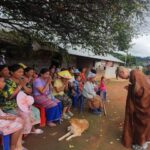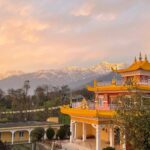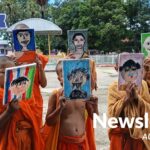 One of the key and unique teachings by the Buddha is the interrelatedness among all beings. The teachings of the Buddha, in addition to the great extent on renunciation, include numerous guidelines of how individuals should live together in a peaceful and beneficial manner. Such socio-political teachings have been the ideology for the kings and emperors in Theravada Buddhist countries in Asia.
One of the key and unique teachings by the Buddha is the interrelatedness among all beings. The teachings of the Buddha, in addition to the great extent on renunciation, include numerous guidelines of how individuals should live together in a peaceful and beneficial manner. Such socio-political teachings have been the ideology for the kings and emperors in Theravada Buddhist countries in Asia.
However in the recent time the architecture of politics in Asia changed tremendously by the influence of the western political ideologies. Many Buddhist people and organizations in Asia found it a challenge to the traditional teachings whether they are still relevant to the politic turmoil in the recent era. Everywhere, we are facing with a problem of how politics should be an origin of happiness, not the grievance, of people. Though the mission of establishing a righteous political platform is not finished yet, the progress so far is satisfied enough to reaffirm the confidence that Buddhism can be one of good resources for this mission. And it can possibly be shared not only for Asia, but in western context as well.
The Buddha and governments in his time
In Theravada Buddhist ideal, there is neither the separation of state and religion, nor the religious state. According to the theory of the two wheels, the state leadership (worldly wheel) and spiritual leadership (religious wheel) exist along side. The state gives support and protection to the religion. The religion gives guidance to the leaders to make righteous policy and decision. The legitimacy to govern depends on how much the worldly leader follows the virtuous direction shown by the spiritual teachers. By this pattern, the religion does not directly involve in the worldly business and the state cannot control the religion domain. The often quoted Buddhist leader who demonstrated this idea is Emperor Ashoka, ruling the Maurya Empire in India during 273-232 BC.
During the time of Buddha, there were several forms of government; absolute monarchy practiced in the greater kingdoms and oligarchic democracy by smaller federation states. The Buddha did not declare which form is superior to others. He engaged in dialogue with monarchs such as Bimbisar of Magadha Empire. He was also familiar with the Vajji federation state. He gave guidance for the governance of both kinds of governance on how to integrate morality into the political affairs. It seems that to the Buddha, the government?s format is secondary to its morality.
But when it comes to the establishment of his own spiritual domain called the sangha, he designed it as a network of small-sized communities in which the members have full participation and responsibility of the community?s affair. The sangha represents the decentralization. At least four members can create their own communities that subscribed to the same teachings (dhamma) and rules (vinaya) resonating the law of nature. The community accepts members who share the common view, regardless of gender, race or caste. The community is designed to facilitate the respectful, peaceful, simple, communal lifestyle and spiritual progress.
Democracy as it is today
Looking at our time, it seems that the choice of government format is limited to democracy or more specifically the American style democracy. It may sound good due especially to the fact that it is the only survival political format from the cold war. The White House is now busy exporting this format to the rest of the world. Even if the only format is copied without the spirit or integrity is fine enough in the eye of this active promoter. This format becomes criteria of a good state otherwise a state may get punished of one kind or another. Though the liberty is the key of democracy, how can it fit into the forceful democratization process?
In the west, there was fear of the interference of religion over state such as the Pope with his hegemonic power ruled over Europe during the middle age until early of modern era. There was competition for power between the two realms leading to the idea of separation of state and religion which is fundamental to the modern state administration. This becomes the philosophy of many countries, including democratic ones. By this division, the state loses a guidance to refine its character. Therefore we witness everywhere the unethical political leadership ranging from sex scandal, to corruption, to short-eye sighted bribery via populist policy, to the exclusion of marginalized people from decision making, to genocide and so on. Similarly, the religion becomes weak and irrelevant to the current issues of the world so much so that its role is confined only within rituals and ceremony. It loses its momentum to tell the worldly leadership what is right and wrong for the benefit of the people.
It is ironic that the further the democracy goes, the smaller the participation shrinks only into the hand of the administrative (not even all politicians) who claim that their legitimacy through election. People are made to believe that politics is the business of the politicians. Their job finished right after the dropping of the ballot. It is not true only in developing countries. In the self-claimed developed world, how much people do have a say in the government?s policy? If they really have significant say, the invasion on the Iraq would have been halted already. People, once excluded from the significant matters, are made to be only a consumer of political news watching what is going on in the parliament as another kind of entertainment.
Meanwhile, democracy itself often becomes a source of agony of the marginalized people. Democracy kind of politics as it is practiced now failed to reflect the voice of marginalized people. When decision is made by number of voting, the voices that matter are from the economically and politically advantage groups that are able to manipulate the public sentiment for their own interests. The poor, the religious minority, the ethnic minority, and other kinds of the minority or non-mainstream cannot lever with them. Ridiculously they are excluded in the political format the boasts to be people-oriented.
Obstacles to self-determination: through a Buddhist lens
It is well accepted that self-determination is critical to true democracy. But sad as it may sound, any social decision making, at personal, national and even international level, according to Buddhist believe, cannot be a perfectly correct decision. The decision will definitely be contaminated by defilement so long as people are not yet enlightened. Therefore, no one can be arrogant about their decision making capacity. It is wiser to be humble, flexible and inclusive while attending a problem.
The Buddhist people are aware that in reality, there is no self. This is a painful fact and difficult to accept. Therefore, an individual tries to attach to his body and mind as a self to coax himself. In the process, there arises the feeling of duality, oneself against others. Besides, a person?s mind is distorted by the three poisons; greed, hatred and delusion. Hence, in the case of untrained mind, a person tends to think for the survival and benefit of his own self and care less for others.
According to Buddhist teaching, there are four cases that support the inclination toward one?s own and the failure to maintain righteous decision and actions. Preference is one. If a person likes some one, some thing, some community, some development scheme, some political ideology, etc. the decision will be made in that favor with little or no contemplati
on at all.
On the contrary, there are many times when a person hates something so much that he will never give it another thought. The decisions and actions resulted from hate are hard to reflect the reality, and therefore can be careless and unjust.
Fear is the third case that bars people from proper decision making. It is very obvious that in the situation that life is at stake, not all people can stand for the integrity. The threat can be against physical, psychological, monetary, status, or other kind of safety of the people. Lack of understanding is the last case. In the time of information age, people are overwhelmed by data and information. The information enables people to know more pieces of news, but does not necessarily make them wise. People often decide their actions based on manipulated, incomplete, confused information or half truth. The four items are the causes for injustice and distorted decision for people.
In addition to personal issue, people are presented with a number of opportunities that required their decision for their collective welfare. There is a wide spectrum of mechanisms in a true democratic system that people can express their political opinion apart from election, e.g. public hearing or even street demonstration. Most of the cases, people articulate their political views for their group interest. Although the so-called new social movement that presents a hope for cross-sector social actions, it is not always the case. It is difficult for untrained mind of ordinary people to overcome the duality that separate oneself, one group vs. the other, one political party vs. the rival party, and even one country vs. another country.
With the separation of one vs. the other, the political actions can be decided to benefit one group while deprive others. The Buddha talked about the five kinds of possessiveness which are relevant until today.
1. Possessiveness in locality or country. If a locality or country is imbued with this kind of attachment, nationalism will arise. This possessiveness connects with the desire for a country to dominate, to be hegemony or superior to other territory.
2. Possessiveness in clan or ethnicity. This attachment makes people to think for their race, color and ethnicity. Knowingly or otherwise it creates the discrimination or even genocide.
3. Possessiveness in material wealth. Capitalism that allows people to accumulate wealth without limit represents this kind of attachment to material wealth. Any part of the planet is well aware of its danger, adverse consequence, especially the alarming gap between the rich and the poor both within a country and among many countries.
4. Possessiveness in social class or caste. The idea on class struggle originated from this kind of possessiveness. It can be applied to the any kind of social grouping, including political one. There are plenty of examples in politics. Instead of righteousness and benefit of the people, politicians vote for their own political party?s policy no matter how bad and against the ideas from the rival party, though it might be good.
5. Possessiveness in knowledge, information, intellectual achievement. In the IT era, such possessiveness may be ridiculous but it is real. Take the notorious and extreme case of nuclear weapons as example. It is fine if US know how to make nuclear weapons and other mass destructive arms, but it is not the case for Iran, Korea, and others which may be included into the Axis of Evil. The more common example may be how the policy on copyrights, intellectual properties and patent come into existence. The way that western researchers are busy patenting the third world?s plants that are commonly in use for ages for their own selfish purpose is very much repulsive.
If politics aims to facilitate the great number of people to live peacefully together, it cannot fulfill its wish so long as its members cannot overcome the attachment to their own interest, deprivation of others and manipulate political means accordingly.
Buddhist Guideline for the Righteous Politics
In the time of the Buddha, the political affair is centralized around the ruling elites. The individual characteristic of the leader is significant to the welfare of the state. He therefore gave a lot of teaching how to be a good leader. One of the suggestions is that the ruler must consult with his ministries, the wise men and the religious teachers in order to cultivate compassion and wisdom.
The quest for politics as if people matter might have been started with the statement of the late Venerable Buddhadasa that politics and dhamma cannot separate. If it does, politics will become a destructive apparatus. He explained extensively in one of his masterpiece Dhammic Socialism that, politics is dhamma. Politics, when properly conducted, is in compliance with the natural law. It is the duty and responsibility of each individual for making collective living peaceful and normal. It is not the duty of the government or the politician only to seek power, fame or wealth.
To some Buddhist scholars such as Buddhadasa, leadership is important for the governance of a country. The leadership will cultivate the aspiration of people and guide the people?s effort toward the righteous direction. Therefore the source of authority is not merely the number of voting. Buddhadasa once said that if five hundred bandits and one monk are to make decision to rob by voting, the monk?s vote will definitely be outnumbered. The group in question will go robbing lawfully although it is immoral action. On the contrary, the leadership finds its legitimacy in moral authority, not political authority, economic authority or authority by birth. This principle leads to the consensus in decision making. If there is any objection even from only a single person, it is worth attending to. The righteous minority must be able to reverse the wrong decision of the majority. Such principles are exhibited clearly in the formation and administration of the sangha, the Buddha?s monastic community.
The Ven. Samdong Rinpoche, the head of Central Tibetan Administration, has been rooted firmly in the Buddha teaching when he designs and runs the exile government. To him, the government must get rid of the concept of duality that divides the ruled and the ruler. The people and the leaders should inter-relate and work together for the benefit of the country. This complies well with one of the key teachings of Buddha the inter-dependence of all beings. To see the inter-dependence is the starting point of the Noble Eightfold Path, the right view, which is the practical step to end suffering.
The more people, including politicians, overcome the dominating concept of duality, the less bias and possessiveness they will have. People will think for the righteousness rather than their selfish individual interest. The attachment to ?me and mine?, i.e. my self, my political party, my trade union, my community, my religion, my ethnic, etc. will be softened. Then the Bodhisattva mind can be cultivated. The Bodhisattva is the person who can see that all people are fellows in birth, decay, illness death, and wish to eradicate their suffering regardless of any causes of discrimination at all.
Then, when people see the oneness of humankind, any thinking for actions concerning collective living, aka politics, will be free from violence, intention to kill, hatred, greed and possessiveness. This falls in the one of the Noble Eightfold path, the right thought. Therefore, if the politicians and people follow this path, the policy will exhibit the compassion, caring and sharing. This principle may sound simple, but it holds immense power to break the violence and materialism-consumerism that are fundamental to westernized societies.
This spir
it of universality can be cultivated via mindfulness practicing. In his book Calming the Fearful Mind, The Venerable Thich Nhat Hanh invited the politicians, especially Americans, to find the peace of mind by mindfully breathing. His demand for the politicians to work sincerely for the benefit of people, instead of their own party and popularity, may sound na?ve. But it is the only way. He believes in Buddha nature of the politicians that, with the mindfulness practice, they will touch their Buddha nature and then place the people?s wellbeing a highest priority. As a starting point, a politician himself practices mindfulness, then after realizing its benefit of peaceful and compassionate mind as well as wisdom, he then introduces the practice to people around him, people who work for him, people who vote for him, and then all people in the country.
The personal transformation for all members of a country, not only the politicians, is critical but not enough to guarantee the righteous politics. Politics must function in the manner that it facilitates the social transformation. Democracy seems to be the only political format that allows considerable participation of people in decision making. Democracy here must be the one that is based on dhamma or morality, not the one with individualistic selfish freedom and competition. Thich Nhat Hanh said in the same book that since on the east coast of the US, there is Statue of Liberty, on the west coast, a Statue of Responsibility should be built to counterbalance.
As an individual needs to practice mindfulness to be aware of his mind, a society, too, needs a mechanism to monitor the collective awareness. People should be encouraged to form people organization. It can be in form of socially engaged spiritual community, trade union, association, council of the senior citizens, non-government organizations, etc. Such people organizations should be a space for people to learn together, take care of and help each others in variety of issues in the society. They can act as the advocate of public interest. However they should base their actions on the universal humanistic values such as compassion, justice, peace, nondiscrimination, truthfulness, etc. though not on a specific religion. The Buddhist ones can be part of them. The mechanism for the collective political actions should be provided for the citizen of a country. The freedom of assembly and expression must be in place so that the civil movements can act as a voice of conscious for the powers that be.
If we wish to follow the example of the Buddha?s administration of his movement known today as Buddhism, the emphasis must be on the decentralization. The small communities of people sharing the common principle, or constitution can function on their own and take responsibility for their own fate. Decentralization is also one of the keys to true participatory democracy because millions of people cannot make direct decision nationally. In many democratic countries with the poor percentage of voting in an election, it is hard to sincerely accept that the election reflects the intention of the majority. But a thousand or two can in the smaller village or town.
One of the experiment of exile government of Tibet tries to do is an election system without political party. It is not a single party politics (like in a communist country), but a partyless one. It is hopeful that this non-duality influenced idea will demolish the fierce competition and the attachment to any political ideology, the party?s interest or policy, while promoting the universal responsibility of the candidate. It will be exciting if other community or town, if not a country, would try this principle.
Righteous Path for a Universal Leadership
Since the time as ancient as the Buddha?s or even much before, the worldly leadership has desired to become a great emperor ruling the whole world. Such desire waged many dreadful wars in human history. With compassion, the Buddha never approved any war. There is no just war in Buddhist knowledge. But even without war, it is possible that a leader can become a global ruler. The only force that can rule over the world that the Buddha agreed is the force of dhamma, of virtue. To him, a king aiming at Wheel Turning Great Kingship (a Buddhist term equivalent to an emperor) will gain his hegemonic power through spiritual virtue, not the arms force.
The quest for hegemonic, global empire of the US has continued since the end of World War II. The arising of Communism and nationalism froze their effort for some period of time. But at the end of cold war, it seems that the only superpower found no rival. But it does not guarantee that other nations would accept its leadership wholeheartedly.
The policy of the White House towards many countries around the world has been problematic. The US has been busy creating wars, conflicts, coup d?etats, murder, and intervention of different kinds throughout the globe. It is sad that US never played a role of benevolent elder brother to protect the weak youngsters. It is very fluent in playing a rogue. The US has always have a choice, even now, whether it will become a compassionate state, using its hegemonic power to spread universal spiritual values or will remain as it has been.
In the Pali text, there is Cakkavatti-vatta, a set of responsibility for people who which to be a universal leader. The teaching starts with the supremacy of law of nature or dhamma that the leader has to follow. Then it talks about the protection of and duty for one?s own family, ministries, native citizens, countries under their protection, scholars and religious people as well as nature and animals. The great leader must guard its people from immorality and wrongdoing. The fair wealth distribution and prevention of poverty is the next responsibility. Seeking spiritual advice and practice accordingly is the last suggestion, which will help the leader to keep his lust and greed under control.
Though the original teachings are for the ancient kings, it holds true for a nation who which to be a leader of a global empire now. The US is fortunate that it possesses advantages in economics, technology, military, and so on. But it will need a great amount of spirituality to get through the leadership crisis and political ethics crisis.
Let us check with the list to see how much that the US fits into the emperorship. In The US society, the people are still suffered with social illness. It apparently fails to take care of wellbeing of its own citizens, needless to say about the non-white countrymen. A lot of its people lead the hopeless, meaningless life. The morality is challenged by the individualist and competitive values in the country. The US is still unable to secure peace and justice to countries that it interferes, for example Vietnam in the past, Iraq, Afghanistan, and many more. The current President is surrounded by the neo Christian right that vigorously promotes hatred and violence via anti-terrorism scheme. It is not apparent that the President is promoting the culture that restrains lust and greed. On the contrary, the US exports so-called American dream which is in fact the culture of consumerism to everywhere in the world. The US is not seen to control its greed for other nation?s natural resources. Globalization, the latest variation of capitalism that it worships and guards, sucks the natural resources from the poor people and poor countries to the minority rich people. This and the previous versions ?progress?, ?development?, become the obviously significant reason for the third world poverty and sever indebtedness. The US plays vital role in degrading the world?s environment, as it denied its commitment to important international environment protection initiatives.
In human history, there had been n
umerous great leaderships ruling over vast empires coming and going. But once such leadership spoiled the abovementioned righteousness, their legitimacy to rule will end. It is true regardless of time and space. The US can learn from the history. It will be fortunate for all beings if the US would recognize its Buddha nature and bring it out to reverse the current deadly trend. If the US starts to engage with the other parts of the world in compassionate manner and seriously considers the Buddha?s suggestion, its attitude and policy toward other will become much more positive. Then, it can be like a Bodhisattva nation that exists and exercises its power only for the benefit of all beings.
However, it is not totally hopeless. More and more people in the western countries, with the growing number in the US, are awakened to the reality. They become aware of the unwise foreign policy and the oppression that the west has done to the rest of the world and try to solve the situation. Many of them are returning to their spiritual root or embracing religions from Asia. It is important that they reach out to deprived people outside the west and join force with them. They are also struggle hard to guard their sustainable livelihood and human dignity.
Finally, we must always bear in mind that it is not a person or a country that we are fighting against to secure the righteousness in politics, no matter how violent he/she appears. It is the defilement in him/her. People of righteousness must start from oneself. We begin to recognize our defilement with mindfulness practice and transform our mind. Then, together as social networks, we must stand against the dreadful politics which is contaminated by the mental defilement of people and the politicians. We must fight with loving-kindness and morality to regain compassion from ruthlessness, sharing from competition, caring from selfishness, and peace from violence and justice from discrimination. Aren?t we right at the moment to make politics a source of true happiness for people and all other beings in this planet?
L. Supamanta is Executive Secretary of
International Network of Engaged Buddhists (INEB).
They can be reached at ineboffice@yahoo.com

